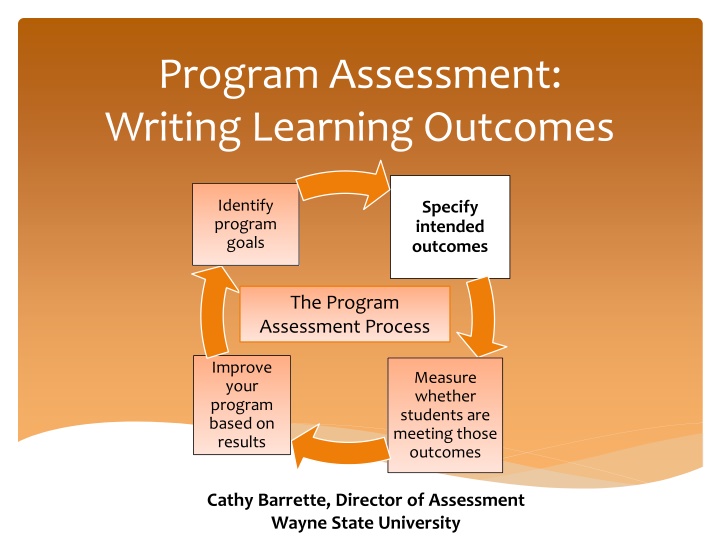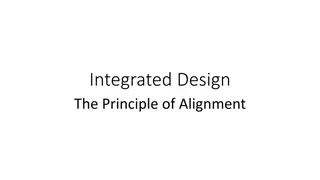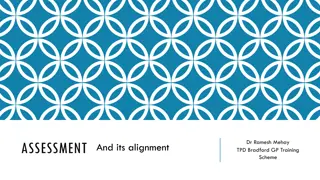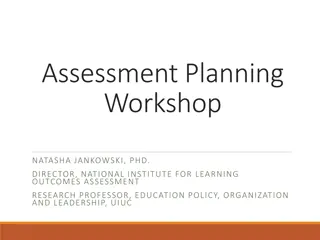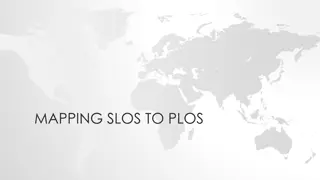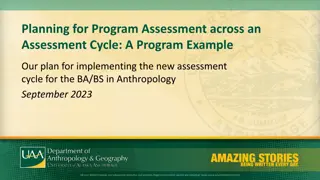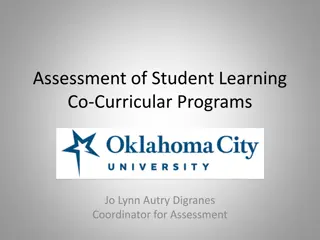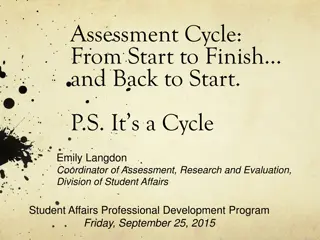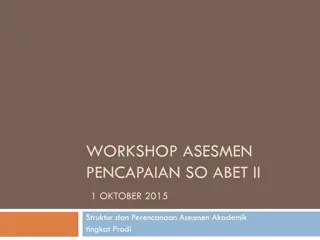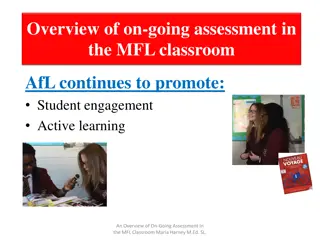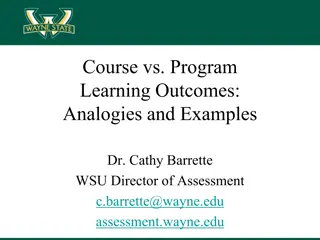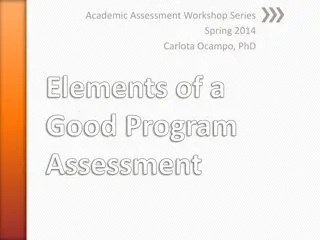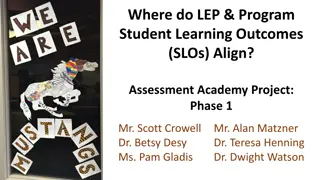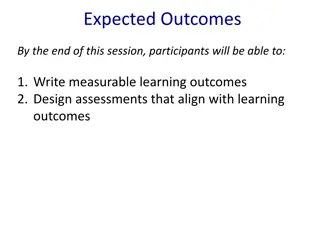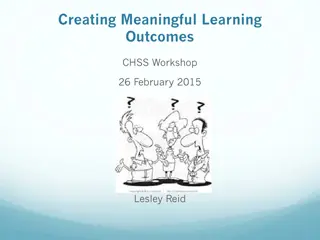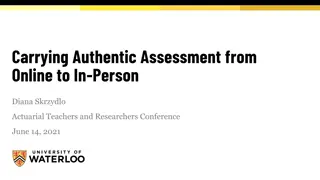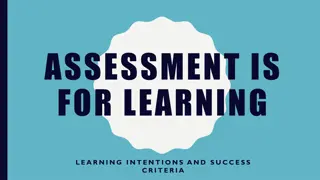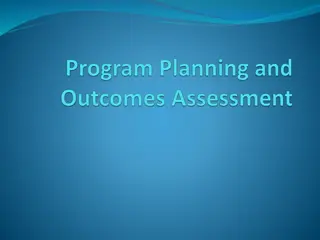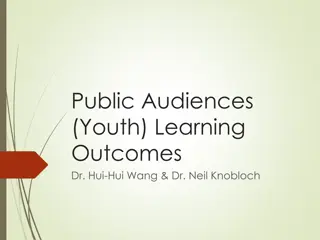Enhancing Program Assessment through Learning Outcomes
Learning outcomes are specific, measurable statements that define what graduating students should know, be able to do, believe, or value. Explicitly stating learning outcomes helps in expressing program benefits clearly to stakeholders, attracting students, and securing donations and resources effectively. Examples from Geneva College, U. Wyoming, and LMU demonstrate how to articulate learning outcomes in different fields such as psychology, statistics, and theatre arts.
Download Presentation

Please find below an Image/Link to download the presentation.
The content on the website is provided AS IS for your information and personal use only. It may not be sold, licensed, or shared on other websites without obtaining consent from the author.If you encounter any issues during the download, it is possible that the publisher has removed the file from their server.
You are allowed to download the files provided on this website for personal or commercial use, subject to the condition that they are used lawfully. All files are the property of their respective owners.
The content on the website is provided AS IS for your information and personal use only. It may not be sold, licensed, or shared on other websites without obtaining consent from the author.
E N D
Presentation Transcript
Program Assessment: Writing Learning Outcomes Identify program goals Specify intended outcomes The Program Assessment Process Improve your program based on results Measure whether students are meeting those outcomes Cathy Barrette, Director of Assessment Wayne State University
Learning Outcomes Statements of the intended results of the program Specific, measurable statements of what graduating students should know, be able to do, believe, or value Derived from the mission statement Focused on the results of student learning, not on the learning process or on teaching At least one assessment (i.e., a source of evidence or data) is needed per learning outcome; two or three is better.
Learning Outcomes: Usefulness Explicitly stating learning outcomes enables faculty and staff to: Clearly express the benefits of the program to stakeholders in concrete terms Attract students to your program More effectively request donations, funding, resources
Learning Outcomes Example: Geneva College Psychology Students should be able to recognize and articulate the foundational assumptions, central ideas, and dominant criticisms of the psychoanalytic, Gestalt, behaviorist, humanistic, and cognitive approaches to psychology. (Note the use of action verbs, which usually correspond to overt behavior that can be measured.) http://oeas.ucf.edu/doc/acad_assess_handbook.pdf
Learning Outcomes Example: U Wyoming Statistics [Students will] Demonstrate understanding of basic concepts of probability and statistics embedded in their courses. [Students will] Demonstrate ability to write reports of the results of statistical analyses giving summaries and conclusions using nontechnical language. http://www.uwyo.edu/statistics/student_learning_outcomes/undergraduate_learning_outcomes.html
Learning Outcomes Example: LMU Theatre Arts Students will Integrate effective use of body and voice in communication in a theatrical space [Value ] Theatre as a live, human, creative, and spiritual experience, which has the power to transform and educate as well as entertain an audience http://cfa.lmu.edu/programs/theatrearts/curriculum/studentlearningoutcomes/
Learning Outcomes Example: Arkansas State U: Housing Provide safe facilities Provide living & learning opportunities beyond the classroom Develop community http://www.astate.edu/a/residence-life/about/goals/
Learning Outcomes: Guiding Questions To help you identify your program s learning outcomes, consider the following questions: What kinds of information does an ideal graduate/client from your program know? What can s/he do? What does s/he value or care about? What kinds of job skills does s/he take into the workforce and the community? (Choose a few of your answers for your first round of learning outcomes and add others later.)
Learning Outcomes: Pitfalls to Avoid Combining two or more ideas into one outcome Describing an outcome that is not measurable Too vague Too broad or inclusive Writing for a specialist audience rather than a general audience Titling the outcome without defining it in layman s terms in the description box
Curriculum Map (for academic programs only) A curriculum map identifies the relationship between courses students take and the program s learning outcomes The level of focus on each outcome can also be specified by indicating whether each outcome is: I- Introduced D-Developed/Practiced/Reviewed M-Mastery demonstrated
Curriculum Map Usefulness By explicitly identifying which learning outcomes are addressed in each course, programs can easily determine whether the program addresses all learning outcomes in a balanced way, or whether there are gaps or an overemphasis in any particular learning outcome.
Curriculum Map Example: WSU MA in Language Learning LO1: Analysis of SLA Research and Pedagogy LO2: Application to Evaluation of Pedagogical Materials Number LGL 5750 LGL 5850/7850 LGL 5860/7860 LGL 5830/7830 LGL 5820/7820 LGL 5810/7810 LGL 7999 I I - I, D I, D D D D M D D D D M Organized by program learning outcome, course, and amount of focus, not by course learning outcomes or by time/semester in the program
Curriculum Map: Guiding Questions Which course(s) contribute to each learning outcome? To what degree? I- Introduced D-Developed/Practiced/Reviewed M-Mastery demonstrated (A template for creating a curriculum map is available on the WSU Assessment website and in Compliance Assist.)
Local Resources for Program Assessment Cathy Barrette, WSU Director of Assessment c.barrette@wayne.edu (313)577-1615 4129 F/AB WSU Assessment website (temporary url) http://undergrad.wayne.edu/assessment.php OTL staff, workshops and website: http://otl.wayne.edu/
Want More Information? Additional presentations explain how to: Conceptualize the overall program assessment process Write mission statements Choose assessments Understand and use results from the assessments Use Compliance Assist to record your work Each part has examples and pitfalls to avoid as well!
